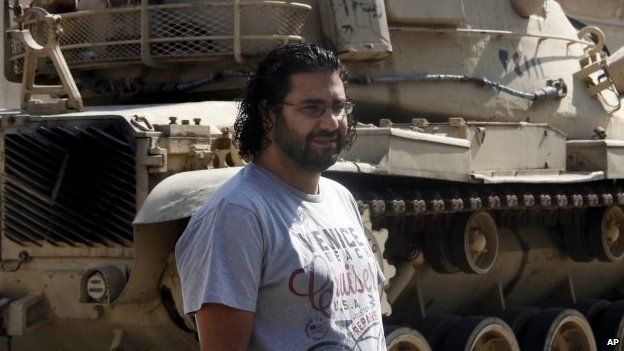Egypt activist Alaa Abdel Fattah to be freed on bail
- Published

An Egyptian court has ordered the release on bail of one of the country's most prominent bloggers and pro-democracy activists, Alaa Abdel Fattah.
Mr Abdel Fattah had been sentenced to 15 years in jail for violating a strict anti-protest law. He is currently facing a retrial in the case.
Mr Abdel Fattah gained fame during the 2011 uprising against the then-President, Hosni Mubarak.
His arrest had heightened fears of a crackdown on dissent in Egypt.
Correspondents say the 15-year sentence was one of the harshest ever awarded to a non-Islamist activist in the country.
Mr Abdel Fattah had been charged with assaulting a policeman at an illegal protest. He was sentenced in June, along with 24 others, but was not allowed to be in court for the verdict.
The same judges presided over his retrial, prompting Mr Abdel Fattah to complain that he had "no confidence" in them.
A lawyer for Mr Abdel Fattah, Mohammed Abdel-Aziz, said on Monday that the judge presiding over the retrial had stepped down at the request of the defence team.
He said the judge had also ordered an investigation into the prosecutor's use of Mr Abdul Fattah's personal videos, "which violated the accused's privacy".
At a previous hearing, the prosecutor had shown videos of family celebrations which had no link to the case, Mr Abdel-Aziz told AFP news agency.
The retrial will resume when a new judge is assigned to the case.
Mr Abdel Fattah is expected to leave prison on Tuesday. Along with two other activists, whose release was also ordered by the court, he must pay 5,000 Egyptian pounds ($430; $700) as bail.
Mr Abdel Fattah comes from a prominent family of Egyptian activists. His sister, Sanaa Seif, is also in custody on charges of violating the protest law.
His father, Ahmed Seif al-Islam, was a leading human rights lawyer and campaigner who died late last month.
Hundreds of people have been killed in street clashes since the military ousted President Mohammed Morsi last year.
Thousands have also been arrested, most of them Islamists who supported Mr Morsi.
The crackdown has since been extended to student leaders and secular activists who had protested against Mr Mubarak.
Former army chief Abdul Fattah al-Sisi took office as president after winning 96.9% of the vote in elections in May - almost a year after he ousted Mr Morsi.
However turnout was below 50%, as Mr Morsi's Muslim Brotherhood and some liberal and secular activists urged a boycott of the poll.
Also on Monday, an Egyptian court sentenced the Muslim Brotherhood's leader, Mohammed Badie, and 14 others to life in jail on charges of murder and inciting violence at protests near Cairo last year.
Mr Morsi's predecessor, Hosni Mubarak, stepped down after mass anti-government protests in 2011, following nearly three decades in power.